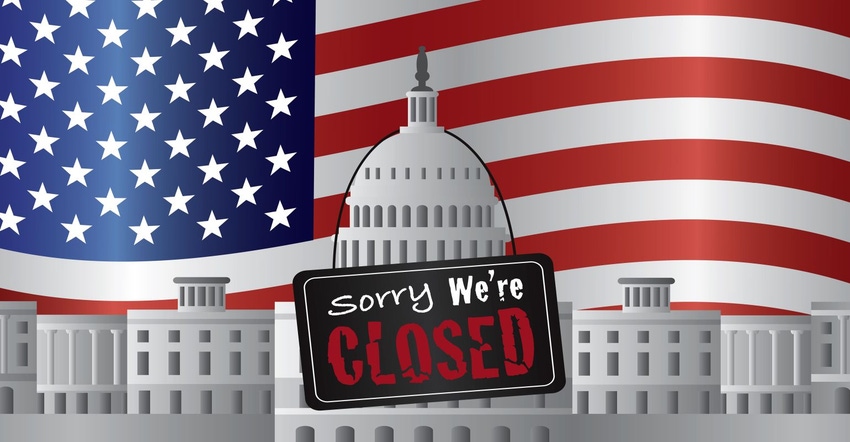Former FDA employees weigh in on gov’t shutdown
Four former FDA officials, including several who worked on dietary supplement issues, discuss the myriad impacts of a government shutdown on the Food and Drug Administration.

The Food and Drug Administration is expected to send home 19% of its employees if Congress cannot reach a deal by Sept. 30 to fund the federal government.
According to a contingency plan from the U.S. Department of Health and Human Services, 81% of FDA staff, or 15,602 employees, will be retained if there is a lapse in government funding. That includes 12,300 employees whose activities or position are already funded or otherwise exempt.
“The Congress is starkly divided over very different paths to preventing a federal shutdown—the (Democrat-led) Senate charging ahead with a bipartisan package to temporarily fund the government but the (Republican-led) House slogging through a longshot effort with no real chance of finishing by Saturday’s deadline,” the Associated Press reported Wednesday, Sept. 27.
During any period with a lapse in funding, FDA can only engage in “limited activities,” according to the independent, nonprofit Alliance for a Stronger FDA in an “FDA Shutdown Tool Kit.”
“The activities that the agency can perform include: (1) activities necessary to address imminent threats to the safety of human life and (2) activities funded by advanced and carryover funds, notably but not exclusively, user fees,” the Alliance stated in the kit.
During the extended 2018-2019 shutdown, 41% of FDA employees, or more than 7,000 individuals, were furloughed, according to the Alliance, citing HHS documents.
At the Federal Trade Commission, which polices advertising of dietary supplements and other products, the agency “will use prior year unobligated balances to fund continued operations for at least three additional weeks (i.e. through Friday, October 20, 2023)—thereby, temporarily avoiding the need to shut down agency operations,” FTC spokeswoman Juliana Gruenwald Henderson told Natural Products Insider.
Steven Grossman, executive director of the Alliance for a Stronger FDA, addressed the impact of a government shutdown on FDA’s food programs.
“We know that FDA will be conducting ‘for cause’ and certain surveillance inspections of regulated facilities,” Grossman said in an email for this story. “We also know that, overall, a higher percentage of employees working on food safety and nutrition will be furloughed because their salaries are almost entirely paid for through budget authority (BA) appropriations. However, beyond the general description in the FY 2024 FDA lapse plan, we do not have granular information on which food safety functions and staff will be retained if a shutdown occurs next week. We know that fewer FDA employees will be furloughed this time, but not where those positions are located with the agency.”
Robert (“Bob”) Durkin was among the FDA employees sent home during the 2018-2019 shutdown while he was serving as deputy director of the Office of Dietary Supplement Programs (ODSP).
A shutdown will affect such FDA operations as routine inspections of manufacturing facilities and review of food additive petitions, GRAS (generally recognized as safe) submissions and new dietary ingredient notifications, said Durkin, who is a partner in the nation’s capital with Arnall Golden Gregory LLP and co-chair of the law firm’s food and drug practice.
He also cited impacts on FDA review of companies’ responses to warning letters and work related to Form 483 documents issued to firms for regulatory violations following an inspection.
“Unless the funding is already established, [FDA] can’t spend money,” he said.
Former ODSP employee Sibyl Swift was sent home as well during the 2018-2019 shutdown, which endured 35 days. She said she was the associate director for research and strategy and directed ODSP’s research and enforcement portfolio. Swift also worked on policy and strategic initiatives for the office.
“I was not deemed to be ‘essential’ so I was told to go home, turn off my work phone and told explicitly to not touch my laptop,” recalled Swift, who is chief science officer and VP of regulatory affairs with cbdMD Inc. “If we worked during the furlough, we were going to be reprimanded when we returned to duty. I was working on initiatives that I felt were important to protect public health but were not essential, so I was not allowed to work. When I returned to work, I had a significant amount of work and had to catch up on initiatives that had languished during the 35-day furlough.”
Swift anticipated FDA domestic inspections would slow significantly during a shutdown, though she said foreign inspections would still occur. FDA in FY22 inspected 17 firms internationally for compliance with the cGMP (current good manufacturing) regulations applicable to dietary supplement products, according to FDA data obtained by Natural Products Insider.
FDA “may still perform ‘for cause’ inspections when they were already aware of safety issues in a firm, but the agency will not perform routine domestic inspections during a furlough,” Swift said. “For an agency that has already been called out for the low number of annual inspections being performed, this is a concern.”
Ricardo Carvajal, a former FDA attorney and current director with the law firm Hyman Phelps & McNamara PC, said he anticipated a shutdown would “have a disproportionate impact on FDA’s foods program because that program is funded primarily through budget authority, as opposed to user fees.”
The Washington, D.C.-based lawyer cited an FDA document showing FY23 budget authority for the foods program totaling $1.2 billion, with less than $12 million coming from user fees.
“FDA will continue to respond to outbreaks of foodborne illness and presumably carry out other critical food safety functions, but it looks like labeling initiatives and premarket review programs such as the GRAS notice program will be on hiatus,” said Carvajal, who works on FDA regulatory issues and previously worked at FDA, where he counseled the agency on policy initiatives, as well as rulemaking and enforcement activities.
“In my experience, shutdowns are pretty disruptive,” Carvajal added. “Staff have to put time and effort into winding down operations in some semblance of order, and then have to spin them back up. Also, the longer it goes on, the greater the backlog that will need to be cleared out upon return—and some of these programs are barely treading water as things stand now.”
A shutdown, however, is not expected to impede FDA’s ability to respond to outbreaks of foodborne illness and other public health emergencies, according to government documents and industry sources.
FDA will call people back into the office if there is an issue, Natural Products Association (NPA) President and CEO Dan Fabricant said in an interview.
In October 2013, when the federal government entered a shutdown, Fabricant was the director of FDA’s Division (now “Office”) of Dietary Supplement Programs. At the time of the shutdown, he said, the vast majority of employees in the Center for Food Safety and Applied Nutrition were furloughed.
Fabricant was sent home for just a day, then called back into the office to respond to a public health threat involving now-defunct supplement manufacturer USPlabs, whose products were linked to an outbreak of hepatitis.
That same month, FDA sent a warning letter to USPlabs concerning its marketing of supplements containing the ingredient known as aegeline. USPlabs in November 2013 told FDA it had destroyed its inventory of supplements containing aegeline and would reformulate its products.
In the event of a shutdown, all essential “FDA activities related to imminent threats to the safety of human life will also continue,” the HHS contingency plan states.
“This includes detecting and responding to public health emergencies, continuing to address existing critical public health challenges and managing recalls, including drug shortages, and outbreaks related to foodborne illness and infectious diseases,” the document adds. “Other vital activities that will continue are surveillance of adverse event reports for issues that could cause human harm, the review of import entries to determine potential risks to human health, determining and conducting systems for cause and certain surveillance inspections of regulated facilities, and criminal enforcement work and certain civil investigations.”
Like Durkin, Fabricant predicted a shutdown would have certain impacts on the dietary supplement program, such as creating delays in FDA’s responses to new dietary ingredient notifications. These premarket notifications are submitted to FDA to demonstrate the safety of novel ingredients in dietary supplement products.
Asked about the impact of a government shutdown, an FDA spokesperson referenced the HHS contingency plan and referred questions to the White House.
On Monday, during a press briefing, White House Press Secretary Karine Jean-Pierre blamed the GOP for a potential shutdown and said a lapse in funding could imperil “vital nutrition assistance for nearly 7 million mothers and young children who count on WIC, prevent farmers from being able to access new loans, and delay housing loans for rural families.”
A shutdown of the government, Agriculture Secretary Tom Vilsack added during the same briefing, “would put many of the critical services that we care about deeply at USDA at risk.”
“FDA provides public health services that are core functions of government. When FDA is unable to perform them, the public is at unnecessary risk,” said Emily Holubowich, president of the Alliance for a Stronger FDA and national senior vice president of federal advocacy at the American Heart Association. “The Alliance will continue to advocate for a prompt resolution of these issues and for minimum disruption to the mission of the FDA.”
About the Author(s)
You May Also Like






.png?width=800&auto=webp&quality=80&disable=upscale)